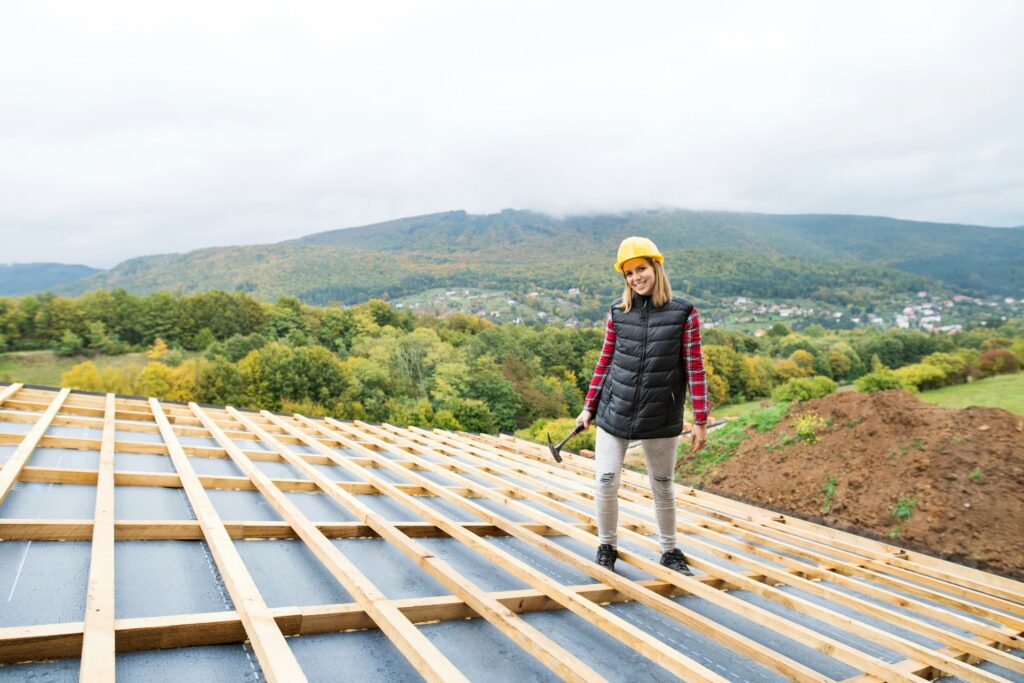Selecting the right roofing materials is crucial for homeowners when considering the overall performance, durability, and energy efficiency of their roofing system. The unique climate and weather conditions in Canada demand that homeowners take into account factors such as temperature fluctuations, snow, ice, and strong winds when choosing appropriate materials for their roofs. Choosing the right roofing materials contributes to the longevity and performance of your roof and helps maintain the aesthetic and monetary value of your property.
Full House Roofing, a team of professional and experienced residential and commercial roofing experts serving Kingston and surrounding areas since 2010, is committed to providing homeowners with essential information and guidance in selecting the best roofing materials for their unique needs. In this guide, we will explore the importance of proper roofing materials selection for Canadian homes, focusing on factors such as durability, weather resistance, energy efficiency, and aesthetics. We will also provide recommendations on the most suitable materials for homes and how we can help homeowners make informed decisions that benefit both their homes and the environment.
By trusting our expertise and understanding the significance of choosing appropriate roofing materials, homeowners can ensure the optimal function, longevity, and aesthetic appeal of their roofing systems. Let us help you make a well-informed decision that maximizes your home’s energy efficiency, resilience, and long-term value.
1. Durability and Weather Resistance
The durability and weather resistance of roofing materials are crucial factors to consider when choosing the appropriate materials for your home. With fluctuating temperatures, snow, ice, and strong winds, selecting materials that can withstand these conditions is essential. Some materials well-suited to the Canadian climate include:
- Metal Roofing: Metal roofs are highly durable, weather-resistant, and lightweight, making them an excellent choice for homes. They can withstand heavy snow loads, strong winds, and are resistant to rust and corrosion.
- Fiberglass Asphalt Shingles: These shingles offer excellent durability and weather resistance, thanks to their fibreglass core and asphalt coating. They can withstand temperature fluctuations, heavy snowfall, and strong winds while maintaining their structural integrity.
- Slate Roofing: Natural slate is one of the most durable and weather-resistant roofing materials, though it can be expensive and require specialized installation. It’s well-suited for cold climates, as it’s resistant to freezing, thawing, and high winds.
2. Energy Efficiency
Roofing materials that provide excellent insulation and energy efficiency are of utmost importance for homes. Selecting materials that minimize heat loss during colder months and reduce heat absorption during warmer months can lead to lower energy consumption and utility costs. Some energy-efficient roofing materials include:
- Cool Roofs: Cool roofs are designed with reflective coatings or light colours that minimize heat absorption, thus reducing cooling costs during the summer months. They can be made from various materials, such as metal, asphalt shingles, or single-ply membranes.
- Insulated Roofing Panels: Insulated roofing panels combine insulation and exterior sheathing in a single product, providing enhanced energy efficiency and temperature regulation.
- Green Roofs: In addition to being eco-friendly, green roofs can also contribute to energy efficiency by providing excellent insulation through layers of vegetation, growing medium, and waterproofing membrane.
3. Aesthetics and Architectural Style
While durability and energy efficiency are crucial factors when selecting roofing materials, homeowners should also consider the aesthetic appeal and compatibility with their home’s architectural style. Some materials to consider for their visual appeal and versatility include:
- Architectural Shingles: These premium asphalt shingles offer a multi-dimensional appearance that can imitate wood shakes or slate, adding visual depth and interest to your home’s exterior.
- Cedar Shakes or Shingles: Cedar provides a warm, natural, and rustic appearance that complements many architectural styles. Bear in mind that cedar requires regular maintenance to maintain its appearance and prevent rot.
- Metal Roofing: Metal roofing can be used in various colours, finishes, and styles, and it can suit a wide range of architectural styles and preferences, from traditional to contemporary.
4. Sustainability and Environmental Impact
Selecting environmentally friendly roofing materials can help reduce your home’s overall carbon footprint and contribute to a healthier planet. Some sustainable roofing materials to consider include:
- Recycled Roofing Materials: Many roofing materials, such as metal, rubber, and composite shingles, can contain recycled content or be recyclable at the end of their useful life.
- Solar Roof Tiles: Integrating solar roof tiles into your roofing material selection allows you to harness solar energy, reducing your reliance on non-renewable energy sources and lowering greenhouse gas emissions.
Make an Informed Decision for Your Canadian Home
Selecting the right roofing materials for your home is essential to ensure durability, energy efficiency, and suitability for local weather conditions. By considering factors such as weather resistance, energy efficiency, aesthetics, and sustainability, you can make a well-informed decision that maximizes your home’s potential and long-term value. Full House Roofing is here to assist you in choosing the best materials for your unique needs, offering expert guidance and professional installation services.
Contact our roofers in Kingston today to learn more about proper roofing materials selection and how Full House Roofing can help you make the best decision for your home. Let us work together to choose materials that ensure the longevity, energy efficiency, and beauty of your roofing system.

